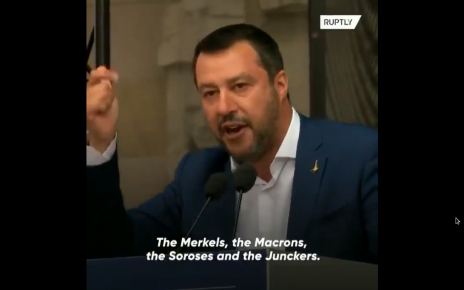Step aside Stephen King, Mary Shelley and Bram Stoker! Submission: The Danger of Political Islam to Canada by Thomas Quiggin …
Source: “Submission: The Danger of Political Islam to Canada” – Mackenzie Institute
Step aside Stephen King, Mary Shelley and Bram Stoker! Submission: The Danger of Political Islam to Canada by Thomas Quiggin with contributors Tahir Gora, Saied Shoaaib, Jonathon Cotler and Rick Gill, is a chilling account of the extent to which the fabric of Canadian society, especially the political arena, has been infiltrated by Islamists. What makes the book more frightening and credible is the dispassionate tone of the authors, and the extensive documentation at the bottom of each page, to support their arguments.
Quiggin knows whereof he speaks. His impressive list of credentials, outlined at the beginning of the book, list him as a court-qualified expert on terrorism (both criminal and federal courts).
The authors differentiate between Muslims for whom Islam is a faith, and Muslims who follow the dictates of Hassan al-Banna, founder of the Muslim Brotherhood, and promoted through its various front groups operating in Canada and other western nations. The Muslim Brotherhood espouses a fundamentalist form of Islam which maintains that Islam must take precedence over all other faiths and political systems anywhere and everywhere in the world.
Education, police services, media and politics have all fallen prey to Muslim Brotherhood adherents. Perhaps the most worrisome is the welcome that has been extended to Islamists by the current Liberal government under Justin Trudeau. In a separate presentation, Quiggin explains that the Islamists have tried to penetrate all three of the major political parties. They are not particularly interested in the NDP since they do not think the NDP will form a government any time soon. And while they were able to gain a toehold in the ranks of the Conservative party, it is the Liberals who opened the door the widest and gave them the warmest welcome.
It is the Islamists who have the ear of the federal government while progressive groups like Muslims Facing Tomorrow, headed by Raheel Raza and her husband, are denied access.
The consequences of this are now evident in movements such as the drive to push through M-103, the brainchild of Liberal MP Iqra Khalid, who cut her political teeth while a student at York University as president of the Muslim Students Association – identified by Quiggin as one of the front groups for the Muslim Brotherhood. If passed, M-103, which elevates Islamophobia above other forms of bigotry, in spite of the fact that recent polls indicate that hate crimes against Muslims are relatively few compared to those experienced by the Jewish, black and LGBTQ communities, would have the potential to shut down any criticism of Islam, including the experiences of Muslim gays and others who have come to Canada from Islamic countries in search of freedom. Equally concerning is the refusal of Khalid to define Islamophobia, leaving it open to interpretation. In a scholarly article by Dr. Wagdy Loza entitled Islamophobia: Between Reality and Fiction, posted on the Mackenzie Institute website, Loza gives eight different definitions of Islamophobia. The implications for leaving the term undefined, should be obvious.
Canadians have been rendered vulnerable by their desire to be seen as welcoming and politically correct. For the last 40 years, we have drunk the Kool-aid of diversity, without stopping to consider that our love affair with diversity and multiculturalism might be seen as a weakness to be exploited by those who do not share our values.
Chapter 16 is a chilling reminder of what is happening in Canada. Chapter 16 is blank. The individual who was to have written it is an apostate—born a Muslim but left the faith. The penalty under Islam for apostasy is death. Fearing retaliation against his/her family, the author declined to write the chapter in spite of the fact that s/he is a Canadian citizen, living in Canada.
Violence, especially terrorism, is one way to achieve dominance. But as the book amply demonstrates, there are alternative routes to the same end, and Canadians need to stop thinking that non-violence equals safety and security. To borrow a phrase: Canadians should be afraid, very afraid.
Quiggin urges Canadians to start asking questions of their elected representatives. They should demand answers as to why the government refuses to meet with progressive Muslim groups; they should ask what steps are being taken to deal with imams who preach hatred against Jews, Christians and others; what charities are funneling money to terrorist groups; why the Liberals engaged in foot-dragging when asked to denounce wife-beating and female genital mutilation; why public schools, required by the Education Act to be secular, have been allowed to become de facto mosques; why some journalists when reporting on these matters, have been the recipients of hostile telephone calls from the highest levels of government; and much more.
The book does suffer from inadequate editing. Typing errors are numerous, and one chapter is particularly difficult to read, owing perhaps to the author not being a native English speaker.
But for all that, it is a compelling read, and a necessary wake-up call for anyone who values the tenets of democracy, especially including freedom of expression, and equal rights for all Canadians – whatever their gender, faith community, and sexual orientation.




